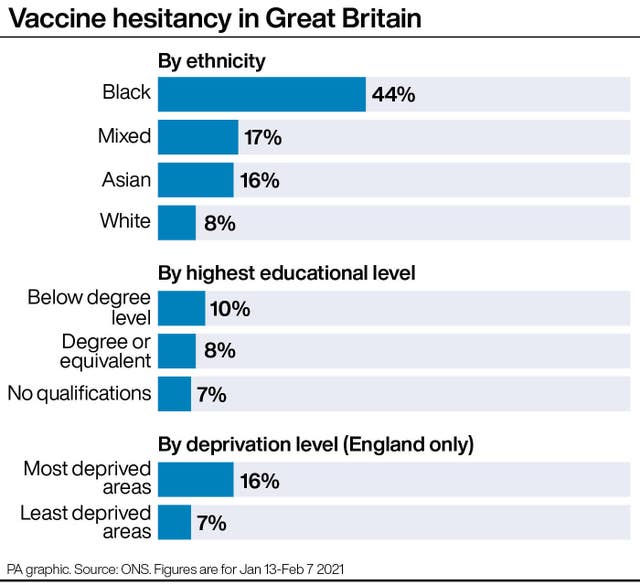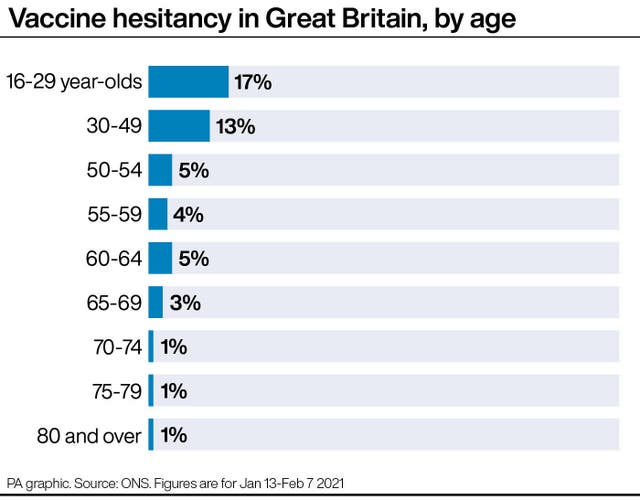Parents of dependent children aged 0-4 ‘more likely to be vaccine-hesitant’
Younger adults, black and black British adults, and those living in the most deprived areas are also more likely to be hesitant, the ONS found.

Parents of children under the age of four are significantly more likely to be hesitant about taking a coronavirus vaccine than those without dependent children, figures show.
Younger adults, black and black British adults, renters, lower earners and those living in the most deprived areas are also more likely to be hesitant, the Office for National Statistics (ONS) said.
It said 94% of those surveyed were positive about the vaccine, up from 78% in December when the data was first collected.
But it found that 9% of 18,112 adults in Great Britain reported vaccine hesitancy between January 13 and February 7.

The ONS defined hesitancy as adults who have refused a vaccine, say they would be unlikely to get a vaccine when offered, and those who responded “neither likely nor unlikely”, “don’t know” or “prefer not to say” when asked.
More than four in 10 (44%) black or black British adults reported vaccine hesitancy.
This was the highest level in all ethnic groups, with the odds of hesitancy six times as high in black or black British adults compared with white adults after adjusting for other factors.
The age group with the highest level of hesitancy was 16 to 29-year-olds, with 17% reporting hesitancy, compared with 1% of those over 80.
The ONS said higher rates of hesitancy in the younger age groups could be driven by the prioritisation of older age groups in the vaccine rollout.
The survey also found that 16% of parents of dependent children aged 0-4 were hesitant, compared with 8% of those without a dependent child.
Parents of dependent children aged 0-4 were 37% more likely to be hesitant after controlling for other factors.
The same proportion (16%) of adults living in England’s most deprived areas were hesitant, compared with 7% in the least deprived parts of the country.
The survey also found that 4% expressed negative sentiment towards the vaccine, defined as adults who have refused the vaccine and those who say they would be very or fairly unlikely to take it when offered.
The most common reasons included being worried about side-effects, the long-term effect on health, wanting to wait to see how well the vaccine works, or not thinking it is safe.
Of those who reported negative sentiment, 11% of women said they were pregnant or trying to conceive and were worried about any effects on the baby.

A fifth of mothers with dependent children aged 0-4 who expressed negative sentiment selected this reason.
Of those aged 16-29 who reported negative sentiment, almost a quarter (23%) said this was because they “do not feel coronavirus is a personal risk”.
Tim Vizard, from the ONS’s Public Policy Analysis division, said: “Over the past three months, we’ve seen people become increasingly positive about the Covid-19 vaccines, with over nine in 10 adults saying they would have it if offered, or having already had it.
“Of those who are hesitant about receiving the vaccine, it’s younger and black adults who are most likely to say this, with concerns around side-effects, long-term effects and how well the vaccine works being the most common reasons.”
The Prime Minister’s official spokesman said: “As we have done throughout the vaccination programme, we will continue to encourage those who haven’t come forward to take a vaccine to do so.
“You are aware of the work we have done with community leaders and community groups to encourage groups to come forward to receive the vaccine and we will continue to encourage them to do so.”
The spokesman said work with “faith leaders and community leaders” was aimed at ensuring “people who are hesitant to come forward and take the vaccine can understand that it is both safe and effective and they should come forward and take it with confidence”.





